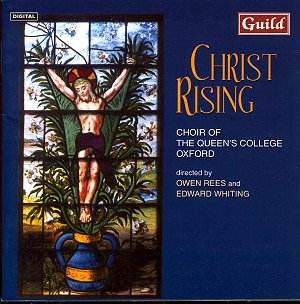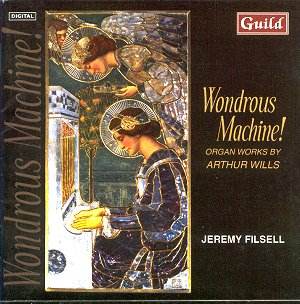 Review of Christ Rising: Music for Holy Week and Easter
Review of Christ Rising: Music for Holy Week and Easter
Performers: Choir of The Queen’s College, Oxford, conducted by Owen Rees and Edward Whiting; George Parsons, organ
Label: GUILD GMCD 7222
Duration: 61:37
Release Date: October 2001
In “Christ Rising,” the Choir of The Queen’s College, Oxford, under the dual direction of Owen Rees and Edward Whiting, presents an intelligently curated sequence of liturgical music for the Triduum and Easter Day. The program navigates the solemnity of Maundy Thursday, Good Friday, and the joyous proclamation of Easter with an insightful blend of English and Iberian choral works spanning the 16th to 20th centuries.
The choice of repertoire establishes a profound meditation on the Passion narrative, beginning with Thomas Tallis’s “Verily, verily I say unto you,” which evokes the Last Supper through its rich polyphonic textures. Tallis’s writing is characterized by a serene unfolding of harmonic language, and the choir captures this with an admirable blend of warmth and precision. The counterpoint flows seamlessly, drawing the listener into the poignant atmosphere of the Eucharistic moment.
Francis Poulenc’s “Tristis est anima mea” resonates with an equally compelling emotional depth. Here, the performance shines through its interpretation of Poulenc’s bittersweet harmonies, with the choir’s mixed voices achieving a striking balance. The delicate ebb and flow of dynamics lend an introspective quality to the piece, underscoring the weight of Christ’s impending sacrifice.
The program’s structure is notably effective, with the Good Friday section meticulously divided into three significant moments: Jesus condemned, The Crucifixion, and the Death of Jesus. Bach’s chorale preludes—specifically BWV 619 and BWV 624—provide a contemplative interlude between these events. The organist, Edward Whiting, performs these pieces with a fluidity that enhances their meditative nature. The choice of a Danish instrument from 1965, with its warm timbre, suits the reflective qualities of Bach’s writing, allowing for a nuanced exploration of his intricate counterpoint.
The concluding selections of this recording, particularly William Byrd’s “Resurrexi” from the Mass Propers for Easter Day, encapsulate the transition from mourning to joyous affirmation. The choir’s rendition is vibrant, characterized by an exhilarating delivery that captures Byrd’s celebratory spirit. This piece stands out as the sole accompanied work on the disc, and the strategic orchestration heightens its festive character.
Notably, the recording benefits from excellent engineering, capturing the choir’s sound with clarity and providing an immersive acoustic space within the chapel. The balance between voices is commendable, allowing individual lines to resonate while maintaining the overall coherence of the ensemble. The careful attention to detail in the recording process reflects the choir’s commitment to authenticity in performance.
This recording also stands as a testament to the historical significance of the chosen works. The inclusion of pieces by composers such as Orlando de Lassus, Tomás Luis de Victoria, and Benjamin Britten highlights the rich tapestry of choral music that has served the liturgical traditions across centuries. Each composer brings a unique voice to the narrative, illustrating the evolution of sacred music while remaining rooted in the theological themes central to the Easter celebration.
In conclusion, “Christ Rising” is a thoughtfully curated and beautifully executed recording that offers a profound reflection on the events of Holy Week and Easter. The choir’s blended sound, the interpretative choices of its directors, and the quality of the recording all contribute to a deeply satisfying listening experience. For those who cherish choral literature, this album stands as a warm recommendation—an invitation to engage with the solemnity and joy of the Easter narrative through the lens of some of the finest composers in the canon.
